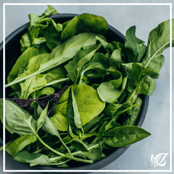Nutrition is always an important part of daily life, but it can be even more important for seniors. What you eat can have a big impact on your overall well-being, and your health. Healthy eating habits can help improve everything from your energy levels, to mood, impact your immune system as well, and affect both your brain health and heart health. Learning what foods are best for you as you age can help you maintain as much youthful vim and vigor as possible, so you can get the most out of your golden years.
For more information on foods for brain health, click here.
Being heart-healthy is a big part of a balanced diet, and can be particularly important as you age. Older adults are more at risk for heart disease, heart attack or high blood pressure, and diet plays a major role in increasing or decreasing these risks. Choosing a heart-healthy diet can help reduce these risks and help you live a long, healthy and active life.
Leafy Green Vegetables:

Veggies are a great healthy option that should be included in any diet - they are packed full of nutrients and vitamins that help you stay healthy and balanced. Leafy greens, in particular, are great for heart health. They are full of minerals and vitamins and are particularly high in vitamin K. This vitamin has been linked with promoting strong arteries, lower blood pressure, and promote proper blood clotting through strong blood vessels.
These vegetables are great for overall cardiovascular health and increasing these types of food has been linked with a lower risk of heart disease.
Whole Grains:
Whole grains are a great option for anyone looking for heart-healthy options. Grains in their whole form are a great source of fiber, and fiber can help reduce blood pressure so it is at a more healthy level. Refined grains (like those used in white bread) usually strip away most of the natural nutrients, and can even have added sugars or bleach that can have negative effects on the body. Good healthy options for whole grains include brown rice (over white), whole wheat or whole grain breads, quinoa, farro, whole-grain pasta, oatmeal, barley, rye, or buckwheat.
 Berries:
Berries:
Berries and fruits in general are another major food group that help with heart health and keeping a balanced diet. There are so many health benefits to adding fruit - especially fresh fruit - to your meals. Berries in particular tend to be a great source of antioxidants. Antioxidants help prevent heart disease by combating risk factors like inflammation. Blueberries are a good source of antioxidants, as are blackberries and raspberries. Adding more berries to your diet can help fight against cardiovascular disease and even reduce levels of bad cholesterol like LDL.
Check out our delicious berry and veggie smoothie recipe here.
Legumes:
Legumes are also recommended by the American Heart Association, and a wide variety of physicians, as healthy options for those looking for heart healthy foods. Legumes such as black beans, lentils, and soybeans. These foods have been linked with reducing bad cholesterol as well as decreasing inflammation and high blood pressure, which both increase the risk of cardiovascular disease.
Choose the Right Fats:
fats are usually thought of as bad, and something to cut out of your diet if you are trying to be healthy. In some ways, this is true, but there is a difference between ‘good’ or healthy fat and ‘bad’ fat. Trans fats are generally not good for you, nor are saturated fats. Unsaturated fats alternatives are much better options.
 Monounsaturated fats are fats in their simplest form, and include things like olive oil or canola oil. While you don’t want to add excessive oils to your diet, these, or alternatives like margarine, are much healthier options than, say, butter or lard. Similarly, polyunsaturated fats can be a great choice for a heart-healthy diet. These types of fats can help lower cholesterol when used instead of ‘bad fats’.
Monounsaturated fats are fats in their simplest form, and include things like olive oil or canola oil. While you don’t want to add excessive oils to your diet, these, or alternatives like margarine, are much healthier options than, say, butter or lard. Similarly, polyunsaturated fats can be a great choice for a heart-healthy diet. These types of fats can help lower cholesterol when used instead of ‘bad fats’.
Foods that have a lot of healthier fats include fatty fish, like salmon, sardines or mackerel (which are high in Omega-3 Fatty Acids), a variety of nuts, avocados, and various seeds. Flaxseed, for example, is a great source of fiber and omega-3 fatty acids and has been shown to reduce cholesterol levels in some people.
Low Fats:
Keeping your diet generally low-fat, though, is good for anyone at risk of heart disease, hypertension, or similar complications. Dairy products can be very high in both bad cholesterol and fat, so reducing the intake of late, or having smaller servings of dairy can help with heart health overall.
Reduce Salt and Sodium:
High levels of salt can increase inflammation, water retention, high blood pressure - which leads to heart problems. Reducing salt levels is a good way to avoid these risks. This does not just mean limiting the addition of salt to your cooking - which usually is minimal. Most salt in today’s world comes from processed foods or canned foods. Soups, frozen meals and even baked goods can have particularly high sodium levels. Focus on fresh foods or home-made foods where possible, or opt for low-sodium options.
Treats in Moderation:

Being Heart-healthy is not just about cutting everything out. You can still enjoy treats -in moderation. Dark chocolate, for example, is a great option for anyone that has a sweet tooth, but who doesn’t want to compromise their diet. Not only is dark chocolate lower in sugar than other chocolate options, but it actually has antioxidants and flavonoids in it which have been linked with a lower risk of heart disease. Of course, moderation is key, and chocolate should not become a staple of your diet.
Similarly, red wine also has its benefits when consumed as a treat. Red wine also has many antioxidants, which come from the grape skins used to make it. These antioxidants can help to prevent coronary artery disease or other heart conditions. Red wines like Pinot Noirs are the best option, but limit your servings - high intake of alcohol has many negative health effects.
You don’t have to be a dietitian to live a heart-healthy life. Overall, it is all about balance. Reduce fat, lower salt intake, increase fruit and vegetables, and swap processed carbohydrates for whole grains. These simple tips can help you prevent risk factors and boost heart health so you can continue to live a healthy, active lifestyle.
For more information on dining options and how Pacifica puts health first, reach out to us or visit your local community. We even have recipes you can try at home! There are so many ways to put your health first, and we are here to help you along the way.

